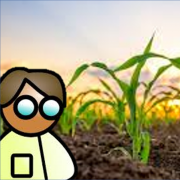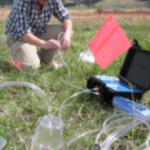Informational interview with Dr. Fawad Shah, President and CEO, Minnesota Crop Improvement Association
By Carl Branch, Conviron Scholar
Dr. Shah, currently the head of the Minnesota Crop Improvement Association, has been involved in plant sciences and agriculture in a variety of roles all across the country. I’ve gotten to know him a little bit as a student in a seed science class this fall, and I think he has a unique perspective as someone who works with people in academia, private companies, and federal and state institutions.
Q: Tell me about your background. What got you interested in finding a career in the plant sciences?
A: In Pakistan, my parents were not farmers; my mother was a teacher. But they told me that agriculture, and feeding the world, was a noble goal. I went for a bachelor’s and master’s degree in plant breeding at the University of Agriculture in Faisalabad. In 1993 I received a scholarship to go to Mississippi State University for a doctorate degree in seed technology.
Q: Can you tell me about what you did after you finished your degree? Did you stay in academia, or did you move on to other jobs right away?
A: I haven’t always been in academia. I was a quality assurance manager for a while at the seed testing lab at Mississippi State. Eventually, I went back to school and got an MBA, also at Mississippi State, and then managed the Variety Establishment Program. This job consisted of performance testing existing crop varieties. Later I moved to Washington State work in their Department of Ag. Here I did seed certification, seed testing, and phytosanitary and regulatory inspection. I was in seed and grain administration, and I later worked in North Carolina enforcing federal seed laws.
Q: Now you’ve moved to Minnesota to work at the MCIA since 2015. It sounds like you’ve moved around quite a bit. Do you have any thoughts or comments on that? Is it worth it? Why leave or why change jobs?
A: In order to move up, you sometimes have to move out. Each time my family and I moved has its own challenges, like settling into a new home. It’s good to balance family with work, even with all the adjustment. Some things I can’t control, like with businesses being bought out. It was a good career move to go from a state agency to the USDA; coming here to MCIA has other benefits.
Q: Was there anything you liked best about any of these jobs? What make the MCIA a unique place to be?
A: Each job has its good things and bad. I’ve liked the ability to work with employees and have a good team. At the MCIA, I have a lot more freedom than what I had at the USDA. There’s a little bit less bureaucracy, and I have more control over my management structure. At the MCIA, I can work more directly with farmers, and there are many good connections here.
Q: Can you tell me more about what you do at Minnesota Crop Improvement Association? I’m not sure everybody that’s going to see this knows about it and what it does. What makes MCIA unique? Do you compete with other organizations?
A: We are the only official seed authority in the state. I oversee certification of seed, use of funds, board relations, employment, and growth, vision, and promotion of MCIA. We work with small grains, corn, soybeans, and turf grass species. There are no sunflower or beet seeds that we handle; all certification is voluntary. We don’t directly compete with other organizations or companies, but employment is one of the biggest challenges we face, it is important to retain good people and to have an environment where people want to work here instead of someplace else.
Q: For the final question, I’ll ask about a comment you made earlier. You mentioned that feeding people through agriculture was a noble goal. In what ways have you been achieving that goal?
A: First, I help to facilitate access to high quality seed for farmers. Related to this is global mission and connection to international markets, and helping outside the U.S. Seeds provide us with food, fuel, feed, and shelter; our society depends on agriculture. It is very satisfying to promote food security, and there are other effects as well. For example, war is caused by hunger, and reducing hunger can support peace as well.
Q: Thank you very much, Dr. Shah, for sharing your unique perspective on your life’s work in the plant sciences. I learned a lot, and I hope someone else will, too!






